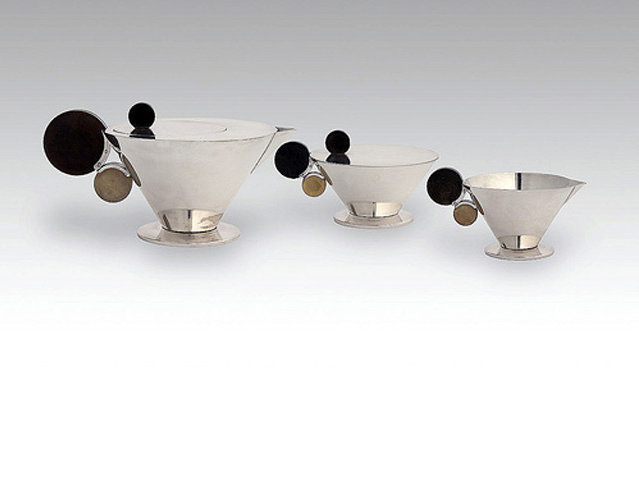In how do you tell a compelling story in about 30 works or less?
Ask Mel Buchanan, Mae E. Demmer Assistant Curator of 20th-Century Design at Milwaukee, because she's done just that with "Grete Marks: When Modern Was Degenerate," a small-scale exhibition that packs a powerful tale of modernist art.
The show, which opened last week and runs through New Year's Day traces the career of Marks, a German ceramic artist who studied briefly at the famed Bauhaus art school in Berlin before heading out on her own and opening a ceramics factory with her husband.
Her Hael Factory – which had more than 100 workers – mass produced works that were rooted in Germany's stoneware tradition, but were also avant garde, with bold geometric designs and expressionistic decoration.
By the dawn of the 1930s, Hael pottery was being exported worldwide and Marks even traveled to New York on a sales trip.
"This is the moment when she's really living the Bauhaus ideal of mass producing modern designs and finding a market for them," Buchanan said during a tour of the exhibition.
The works themselves are remarkable. They are playful, they take chances, they hint at the future not only of modernist art, but of mass produced design. Colors conjure the Fiestaware of the future, shapes predict smart-looking household items.
In the 1920s she was a modernist making her mark and a woman excelling in a male-dominated society.
But by 1933 one male would dominate German society more than any other and within two years, the Marks – who was Jewish and left-leaning politically – was labeled a "degenerate" artist.
Goebbels' newspaper railed against Marks and she was compelled to sell her factory to a Nazi party member at a price far below market value.
Fleeing to England, Marks began working almost immediately and never stopped.
"She was an artist throughout her life," said Buchanan. "She did watercolors, she did oil paintings, she did ceramic mosaics, she had exhibitions of her work. she lived as an artist for the rest of her life."
Marks died in 1990 at age 91. A few years early she received some restitution from the German government for the forced sale of her factory.
"She didn't live to see the exhibitions that celebrate her legacy," said Buchanan.
"She always struggled to be an artist, but we're hoping shows like this will introduce her name back into the canon, because I think she's one of the rare Bauhaus success stories. She took those lessons in modernism and mass production and she left the school and went out and did it. She found a market for modernism."
Buchanan said the show has been in the works since she arrived at the Milwaukee Art Museum in 2009.
"I moved to Milwaukee from Rhode Island School of Design and we were there putting together a 20th century design survey and were talking about the Bauhaus and we didn't have any women or ceramics in this little section," she recalled.
"These two objects came up for auction at Sotheby's in 2007 and we brought them into the collection and this is such a great story that I just kind of kept it in my back pocket.
"These exhibitions take years, it connects so closely to our interest in German art, our interest especially to German expressionism and modern and its a great story we felt the community would support it, the artwork spoke for itself. It's been on the books for a while and here it is open."
Born in Brooklyn, N.Y., where he lived until he was 17, Bobby received his BA-Mass Communications from UWM in 1989 and has lived in Walker's Point, Bay View, Enderis Park, South Milwaukee and on the East Side.
He has published three non-fiction books in Italy – including one about an event in Milwaukee history, which was published in the U.S. in autumn 2010. Four more books, all about Milwaukee, have been published by The History Press.
With his most recent band, The Yell Leaders, Bobby released four LPs and had a songs featured in episodes of TV's "Party of Five" and "Dawson's Creek," and films in Japan, South America and the U.S. The Yell Leaders were named the best unsigned band in their region by VH-1 as part of its Rock Across America 1998 Tour. Most recently, the band contributed tracks to a UK vinyl/CD tribute to the Redskins and collaborated on a track with Italian novelist Enrico Remmert.
He's produced three installments of the "OMCD" series of local music compilations for OnMilwaukee.com and in 2007 produced a CD of Italian music and poetry.
In 2005, he was awarded the City of Asti's (Italy) Journalism Prize for his work focusing on that area. He has also won awards from the Milwaukee Press Club.
He has be heard on 88Nine Radio Milwaukee talking about his "Urban Spelunking" series of stories, in that station's most popular podcast.







